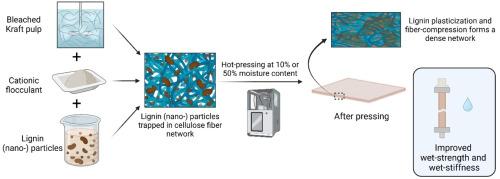硫酸盐木质素作为纸浆模塑材料的湿强和湿刚度添加剂
IF 13
Q1 MATERIALS SCIENCE, PAPER & WOOD
引用次数: 0
摘要
纤维素基材料来源于可再生资源,由于其可回收性和可生物降解性而获得新的重视。然而,一个基本的挑战是它们对水的高度敏感性。因此,添加湿强剂(WSA)对于在潮湿或潮湿的条件下保持强度和完整性是必要的。本文以工艺木质素为WSA,对漂白后的硫酸盐浆进行热压处理,得到具有替代塑料潜力的材料。在过滤过程中使用阳离子淀粉或阳离子絮凝剂(PCB 20)作为助留剂。研究了热压过程中水分对木质素颗粒大小的影响。结果表明,压榨过程中水分升高对干强度和湿强度的影响最大。湿强度(拉伸试验),高达9兆帕,湿强度保持率,高达12%,当水分存在时,压榨。然而,絮凝剂的种类和木质素颗粒的大小对强度的影响也有限。湿强度的提高很可能是由于木质素在高温下的塑化,而水的进一步帮助。纤维素-木质素网络通过木质素的熔融得到强化,冷却后网络巩固。在木质素的作用下,纤维素基体的湿刚度从200 MPa提高到938 MPa,同时伸长率保持不变,未发生脆化。因此,本文的结果可能为纸浆模塑和纤维素基塑料替代品的新发展铺平道路。本文章由计算机程序翻译,如有差异,请以英文原文为准。

Kraft lignin as wet-strength and wet-stiffness additives for molded pulp materials
Derived from renewable resources, cellulose based materials are gaining new importance due to their recyclability and biodegradability. Still, one fundamental challenge is their high sensitivity to water. The addition of wet strength agents (WSA) is hence necessary to maintain strength and integrity in humid or wet conditions. In this article, technical lignin was used as WSA in bleached kraft pulp, which was thermopressed to materials with the potential to replace plastics. Cationic starch or a cationic flocculant (PCB 20) was used as a retention aid during the filtration process. The effect of moisture during thermopressing and lignin particle size were also studied. The results showed that elevated moisture during pressing had the biggest impact both on dry and wet strength. Wet strength (tensile test), up to 9 MPa, and wet strength retention, up to 12 %, were obtained when moisture was present during pressing. However, the type of flocculant and the size of the lignin particles also had a limited effect on the strength. Wet strength improvement was most probably due to the plasticization of lignin at high temperatures, which was further aided by water. The cellulose-lignin network was strengthened by the melting of lignin, consolidating the network after cooling. The wet stiffness of the cellulose substrates was also increased from 200 to 938 MPa in the presence of lignin, while the elongation was maintained and no embrittlement was observed. The results in this article might hence pave the way for new developments in molded pulp and cellulose based plastics replacement.
求助全文
通过发布文献求助,成功后即可免费获取论文全文。
去求助
来源期刊

Journal of Bioresources and Bioproducts
Agricultural and Biological Sciences-Forestry
CiteScore
39.30
自引率
0.00%
发文量
38
审稿时长
12 weeks
 求助内容:
求助内容: 应助结果提醒方式:
应助结果提醒方式:


